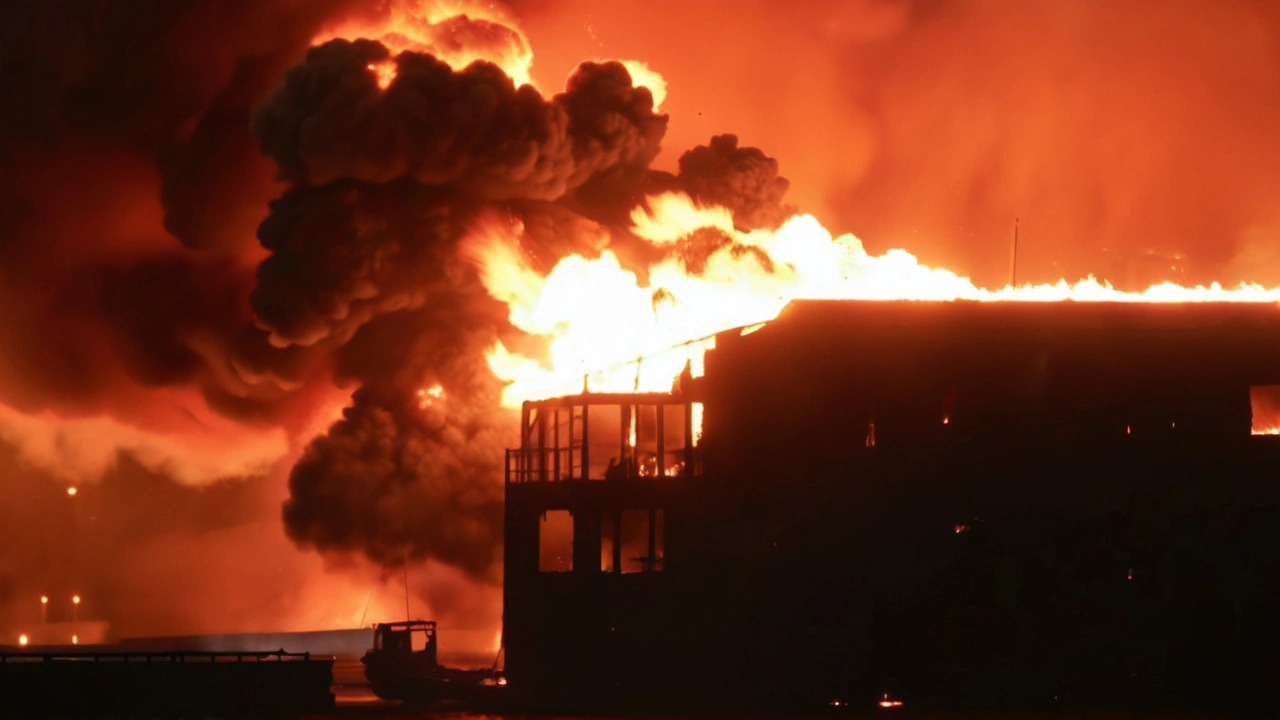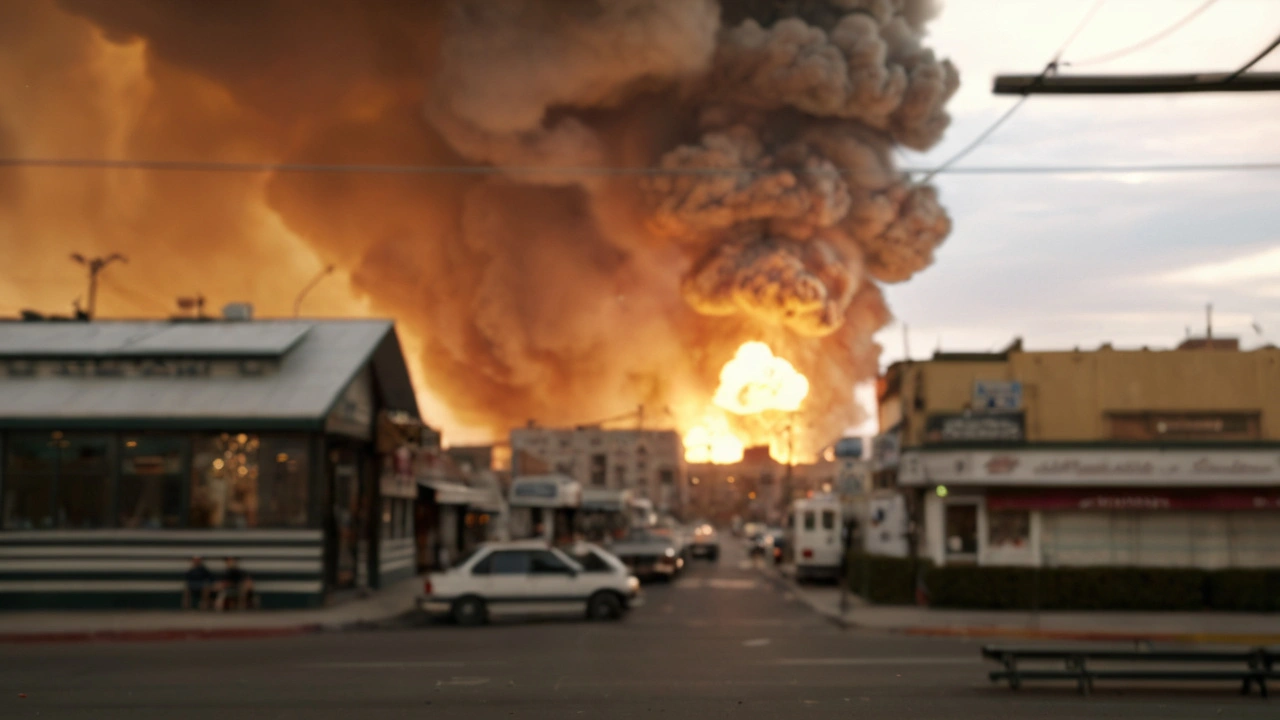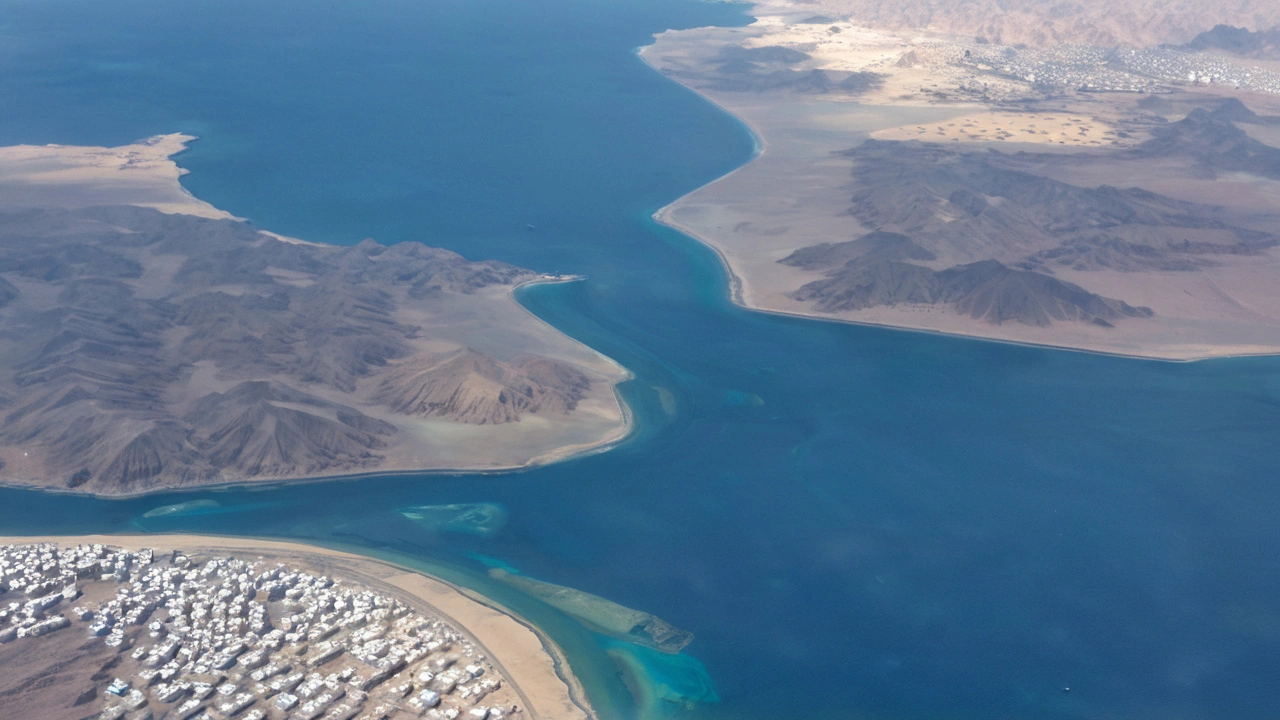Background of the Conflict
The conflict between Israel and Houthi rebels in Yemen has escalated significantly with the recent Israeli Defense Force (IDF) strike on the port of Hodeidah. On Saturday, in a pointed response to months of increasing Houthi rebel attacks, including a deadly drone strike on Tel Aviv, the IDF launched an aerial assault targeting a fuel depot and the port infrastructure. The move signifies a marked intensification in the multi-front conflict that Israel finds itself embroiled in, particularly against Iranian proxies in the region.
Details of the Strike
The strike on Hodeidah port, a significant logistical hub controlled by the Houthis, saw strategic targeting of fuel depots – pivotal for the sustenance of Houthi operations. According to Al-Masirah, a media outlet under Houthi control, the attack led to considerable civilian casualties. At least three people were reportedly killed, and 87 others sustained injuries, including burns, adding to the already grim humanitarian situation in Yemen.
This operation is Israel’s first known retaliation on Yemeni soil in response to the Houthi’s aggressive tactics. The intensity and precision of the strike underline Israel’s resolve to neutralize threats emanating from Houthi-held territories. This determination is fueled primarily by a drone attack on Tel Aviv by the Houthis, which left one individual dead and ten others injured. The incident has dramatically raised the stakes and brought the geopolitical chessboard into sharper focus.

Reactions and Consequences
The strike has drawn varied reactions domestically and internationally. The Houthi Parliament has vehemently condemned the Israeli action, calling it an unwarranted act of aggression. It has appealed to the international community to denounce Israel's actions and criticized the global powers for their alleged indifference towards Israeli military operations, particularly in Gaza. The IDF, on the other hand, has justified their strike citing the port’s alleged use by Houthis to smuggle Iranian weapons into Yemen, fostering a narrative of self-defense against terror proxies.
Rear Admiral Daniel Hagari, IDF spokesperson, emphasized that Israel is engaged in a multi-front war with Iran, which they accuse of orchestrating a network of terror factions aimed at destabilizing Israel. The statement aligns with the narrative that the port of Hodeidah has been instrumental in facilitating Houthi access to Iranian military resources.
Escalating Conflict
The Houthis, officially known as Ansar Allah, did not take long to respond. A statement from the Houthi Armed Forces declared impending substantial retaliation, which many fear could escalate the violence in an already volatile region. The assurance of significant retaliation signals the potential for further conflict, which could draw in various regional actors and exacerbate the Middle East’s intricate web of hostilities.
The international community watches apprehensively as the situation develops. The United Nations and various humanitarian organizations have expressed concern over the mounting civilian toll in Yemen, which has already suffered prolonged conflict and dire humanitarian conditions. The recent spike in violence could hinder relief operations and exacerbate the shortages of essential resources, plunging the populace into further despair.

Historical Context
The Houthis have been a prominent force in Yemen since their insurgency escalated into a full-blown conflict in 2014, leading to them seizing control of significant territories, including the capital Sanaa. Backed allegedly by Iran, their campaign has been marked by fierce confrontations with the Yemeni government and its Saudi-led coalition allies. The inclusion of Israel in this conflict introduces a new dimension, potentially widening the scope of the proxy battles playing out in the Middle East.
Similarly, Israel has been on high alert in defending itself against perceived Iranian encroachments. The belief that Iran, through its proxies, seeks to establish operational bases close to Israeli borders has led to numerous preemptive and retaliatory strikes by the IDF in various theaters. The extension of these operations into Yemen is indicative of the broader strategy to counteract Iranian influence in the region.
Global Implications
The multi-front conflict involving Israel, Iran, and their respective allies poses significant global implications. The Red Sea’s strategic importance, through which a significant portion of the world’s maritime trade traverses, cannot be understated. Any further destabilization could lead to disruptions in shipping routes, impacting global trade. The international diplomatic efforts remain strained as they navigate the complexities of regional allegiances and geopolitical strategies.
As the situation remains fluid, the need for diplomatic interventions and conflict resolutions becomes ever more pressing. This latest development underscores the intricate and often volatile nature of Middle Eastern geopolitics, where historical enmities and modern strategic interests continually collide.
The world now waits with bated breath to see how the unfolding events will shape the region’s future and, by extension, impact global stability. Every move on this geopolitical chessboard holds the potential to either escalate or de-escalate the situation, making the stakes exceptionally high for all involved parties.

Jaden Jadoo
July 22, 2024 AT 00:25The drums of conflict echo louder than any diplomatic whisper, reminding us that power is often measured in ash.
Traci Walther
July 22, 2024 AT 01:36We cannot let the loss of innocent lives fade into the background!!! 🌟💔 Let’s stand together, amplify the cries for peace, and push for humanitarian corridors!!! 🌐🤝🔥
Ricardo Smalley
July 22, 2024 AT 03:00Oh, because bombing a port full of civilians is the perfect solution to “deterring” terror, right? The logic is as airtight as a paper bag in a storm. Maybe next time they’ll try a postcard rather than a missile. The region definitely needed another headline.
Sarah Lunn
July 22, 2024 AT 04:23The reckless disregard for civilian safety is an unforgivable crime, and anyone who attempts to justify it with flimsy “self‑defense” rhetoric is complicit in the murder.
Gary Henderson
July 22, 2024 AT 05:46Seems like the conflict is spiraling again, and the stakes for the local folks just keep getting higher.
Julius Brodkorb
July 22, 2024 AT 07:10Totally agree; the ordinary people caught in the crossfire deserve more than just a footnote in strategic calculations.
Juliana Kamya
July 22, 2024 AT 08:33While the headlines scream war, we must also amplify stories of resilience and cooperation that can pave the way for a more stable future.
Erica Hemhauser
July 22, 2024 AT 09:56Targeting civilian infrastructure is a blatant violation of international norms and cannot be excused.
Hailey Wengle
July 22, 2024 AT 11:20What they don’t tell you is that this strike is part of a larger scheme to control Red Sea shipping routes!!! The hidden hands are pulling strings behind every missile launch!!!
Maxine Gaa
July 22, 2024 AT 12:43Is the escalation a symptom of deeper geopolitical entropy, or merely a cascade of isolated retaliations that echo through history?
Katie Osborne
July 22, 2024 AT 14:06It is imperative that all parties adhere to the principles enshrined in international humanitarian law, ensuring the protection of non‑combatants amidst ongoing hostilities.
Kelvin Miller
July 22, 2024 AT 15:30The recent strike demonstrates a concerning trend of expanding conflict zones, which necessitates a coordinated diplomatic response to mitigate further civilian casualties.
Sheri Engstrom
July 22, 2024 AT 16:53The narrative presented by mainstream outlets often reduces complex geopolitical maneuvers to simplistic good‑versus‑evil storylines, obscuring the underlying power dynamics at play. In reality, the Israeli strike on Hodeidah is not an isolated incident but a calculated escalation within a broader strategy to project power across the Red Sea corridor. By targeting fuel depots, Israel aims to disrupt logistical networks that, according to intelligence assessments, facilitate the transfer of Iranian weaponry to proxy forces. This objective, while framed as a defensive measure, inevitably inflicts collateral damage on civilian populations already burdened by years of famine and displacement. Moreover, the decision to conduct an operation on Yemeni soil signifies a willingness to breach sovereign boundaries, raising profound questions about the legality under international law. Critics argue that such actions undermine the United Nations' efforts to broker a ceasefire and exacerbate humanitarian crises. Proponents, however, contend that preemptive strikes are necessary to neutralize emergent threats before they materialize into larger attacks. The paradox lies in the fact that each act of retaliation fuels a cycle of vengeance, rendering any temporary security gains precarious at best. Historically, proxy conflicts in the Middle East have demonstrated that external interventions often prolong suffering rather than resolve underlying grievances. The Houthis, emboldened by Iranian support, continue to launch missile and drone attacks that threaten regional stability, yet their tactics also endanger their own civilian constituencies. As the Red Sea remains a strategic artery for global trade, any disruption reverberates through international markets, inflating shipping costs and affecting economies beyond the immediate theater. Diplomatic channels, though strained, remain the most viable path to de‑escalation, provided that all stakeholders commit to transparent dialogue. Humanitarian organizations have repeatedly highlighted the urgent need for safe corridors to deliver aid, which are jeopardized each time military assets are deployed near civilian hubs. In the absence of a coordinated ceasefire framework, the risk of miscalculations escalates, potentially drawing additional regional actors into the fray. Ultimately, the international community must reconcile the imperative of countering terrorism with the moral responsibility to protect innocent lives. Failure to do so not only tarnishes global ethical standards but also sows the seeds for future conflicts, perpetuating a vicious cycle that benefits no one.
Prudhvi Raj
July 22, 2024 AT 18:16Another tragic escalation.
jessica zulick
July 22, 2024 AT 19:40Amidst the smoke and steel, the human spirit endures, urging us to seek peace beyond the battlefield.
Partho A.
July 22, 2024 AT 21:03The complexities of this conflict require measured analysis and multilateral engagement to achieve lasting stability.